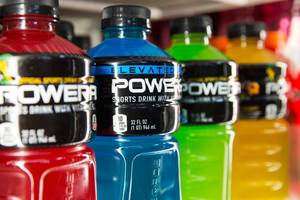 Coca-Cola is removing the controversial ingredient Brominated Vegetable Oil (BVO) from Powerade, Consumerist reports.
Coca-Cola is removing the controversial ingredient Brominated Vegetable Oil (BVO) from Powerade, Consumerist reports.But if you are getting ready to cheer and gleefully guzzle down some Powerade, you might want to reconsider: Removing BVO from sweetened beverages, as PepsiCo did with Gatorade last year, does not make them healthy.
In fact, most soft drinks are already pretty bad for you, BVO or not.
*What is BVO?*
If beverage manufacturers added fruit and citrus flavoring to carbonated water without a stabilizer like BVO, the flavor would separate from the water and float to the top. (Imagine trying to keep oil and water evenly mixed.) This would look gross and probably taste unpleasant too.
Adding BVO to flavorings lets food scientists change their density, so that they evenly mix with the rest of the drink and ensure you get that lemony flavor in every sip. (Yum, chemistry!)
BVO is found in Mountain Dew, Fresca, Fanta Orange, and a number of other citrus-y drinks. (Update: Coca-Cola said it would remove BVO from Fresca and Fanta by the end of the year.)
It caused a ruckus last year when a teenager's Change.org petition asking Gatorade to remove it garnered more than 200,000 signatures.
She pointed out that it was also used as a flame retardant ("Its use as a flame retardant does not preclude its use as a food ingredient so long as the food use is safe," an FDA spokesperson said). The EPA is currently investigating the health risks of brominated flame retardants, but we'll stick to a discussion of the use of BVO as a food additive.
*Is BVO safe?*
For decades, the FDA has allowed BVO as a food additive on an "interim" basis, meaning they believe it is safe, although additional studies could conceivably find that it should be banned (as it is in the European Union). The concentration of BVO in a beverage cannot legally exceed 15 parts per million (that's 0.0015%).
There is some concern that BVO builds up in the body, reaching levels that could be dangerous. But early FDA studies actually tested BVO in animals at levels as high 3,600 parts per million and found no effects.
While there's plenty of reasons to double check the safety of chemicals in our foods, an ingredient like BVO added in tiny amounts is not the real problem with your soda addiction, and focusing on these compounds takes away the heat from the real problem: the added sugar.
*Newsflash: Soda is not healthy*
Stories of people who have been poisoned by BVO miss the main facts: These people were drinking soda in mind-blowing amounts.
You may have heard about the man who developed a rare case of brominism (a kind of poisoning) after drinking too much fruity soda. The story is true — but there's an important caveat: *He was drinking two to four liters of the soda every day.*
Another patient, a 63-year-old man, developed ulcers on his hands after drinking 8 liters of Ruby Red Squirt — daily, for several months.
That means that while both men were consuming more BVO than was safe, they were also ingesting a minimum of 250 grams of sugar — more than 20 times the amount recommended by the World Health Organization's updated guidelines.
"Any normal level of consumption of BVO would not cause any health problems — except the risk of diabetes and obesity from drinking that much sugar water," Zane Horowitz, medical director of the Oregon Poison Center, told Environmental Health News.
*What should you do?*
Powerade, Gatorade, and other sports drinks don't have nearly as much sugar as, say, Mountain Dew, but they still have around 20 grams per serving — or up to 50 grams if you thirstily consume a whole bottle after a run. While brominated vegetable oil comes near the very end of Powerade's ingredient list, high-fructose corn syrup is number two.
"While any harms of BVO are speculative, the public health toll of excess calories and sugar is well-established," notes Dr. David Katz, the director of the Yale Prevention Research Center. "I don't drink any of the products that contain BVO — and wouldn't drink them if they didn't, either."
You may want to follow Katz's advice: If you're concerned about your health enough to petition a soda company about BVO, you'd be better off just avoiding soda and sugar-sweetened beverages all together.
*SUGAR IS THE REAL PROBLEM: Here Are 15 Terrible Things That Happen If You Eat Too Much Of It*
Join the conversation about this story » Reported by Business Insider 3 hours ago.